Not everyone is so fortunate.
There are numerous social services agencies and programs, but, sadly, many of the homeless do not use them. Fatigue and hunger make it difficult to think about what one needs to do from one day to the next, as survival itself is the priority. Without a vehicle or money for a bus, the nearest shelter or county office might as well be on the moon. Then there is the interview with an agency representative, the paperwork and pointed questions.
The need for advocates and for mobile services that meet the homeless where they live is clear; and there are, indeed, some notable outreach programs, including one run by the police department, that do just this kind of work. However, the demand exceeds supply.
Still, there is a more elusive problem at work: a homeless life is tenuous, and a homeless person does not have the mental acuteness that generally attends persons who are housed. The homeless do not spend a lot of time thinking about the future, for example. Thinking is necessarily short-term, as resources that would make planning ahead sensible and easy, such as a phone or automobile, are lacking.
Homelessness is very much about being here now, an inconsonant twist on the new age mantra. The wandering mendicant of India who walks the country with rice bowl in hand did not slide into poverty by an accident of fate, however; and even if begging has an honorable history, homelessness in our modern society gets none of the respect. Still, someone like me might more accurately be described as a sanyassi or bhikkhuni, except, outside of a willing participation in social service programs, I do not beg.
Rather, I make a point of giving, usually money, to anyone who asks. It seems only decent, and I want to set an example for other people in vehicles behind me at a busy intersection or for those who are parked alongside me in front of the 7-11, in those open, public spots where one finds beggars. After all, we have become a niggardly people, inculcated by years of exposure to religious extremists and Darwinian survivalists to believe that poverty is some kind of isolated incident that occurs in a vacuum to persons who deserve it, rather than an indication of something systemically wrong with our culture.
It takes energy to think and plan, and some homeless never really sleep, at least, not well. My friend, Robin, and her partner, John, are always worried about being rousted by the police. They have been homeless for five years and have had troubling and wearisome experiences, even though they have not yet had to sleep out in the open.
Robin and John had a newer model Volvo, which I had grown accustomed to seeing. They also had two small dogs whose barking in the morning gave me a homey, comfortable feeling; but Robin, John, and the dogs went missing for several weeks. When they reappeared, they were driving a small Toyota pickup with a camper shell that did not exactly fit the dimensions of the back of the truck. The camper shell hung off the rear by a couple of feet.
Cause for worry.
Robin and John told me they had been stopped by a policeman and ordered out of their Volvo. The officer wanted to know if Robin had leashes for the dogs because he was having the car towed away. The couple was left on the street with two dogs and all their worldly possessions.
This is where the stories of the homeless get complicated and tiring because of the frustration of having heard similar accounts and not knowing what, if anything, can be done. Nonetheless, somewhere, this couple had another vehicle, the old Toyota truck. It took a while, apparently, to get to the storage site, and then the truck needed repair. They were back at the yacht club, but Robin awoke at night every time she heard a car in the parking lot, afraid that the Toyota, perhaps not street-legal because of the camper shell, might also be towed.
It is not clear why the Volvo was towed in the first place: it is not uncommon, and no surprise, that the homeless often drive vehicles with lapsed insurance or registration, or both. While the police tend to ignore the homeless if they can, their job, after all, is to enforce the law; but Robin claims the policeman stole her car because he is involved in racketeering in vehicles, and the newer Volvo, confiscated at no cost to the police department, has good resale value.
Maybe she's right.
After all, Bob is still in his run-down truck, even if the police do rout him repeatedly from one place to another. And, I, too, am still in my road warrior, though I had a close call. I was stopped by a policeman one evening because, he said, the tow ball on the back of my truck was obscuring the license plate. That tow ball had been there for 35 years, so the officer's reason for stopping me seemed like a pretense to hassle someone homeless, though, really, I cannot be sure.
Certainly, the tow ball gave the policeman the excuse he needed to check my license and registration, both of which were suspended. Though it is a very long story, I was in the midst of a communication by mail with the judge who levied the suspension on my driver's license. I had failed to pay a traffic fine because I could not afford it, and I was due to hear back from the judge in a matter of days on a reduced bail. I begged the officer not to ticket me because I was taking care of the problem and could prove it. Besides, I was clearly already struggling to pay a fine to the DMV.
The officer was not sympathetic and wrote up the ticket, anyway, as he recited the sacred chant of the highway patrol, "Driving is a privilege, not a right," after which a driver is supposed to shut up and look like she agrees. He said I was lucky that he was not going to tow my truck even though he could, in a tone that meant he had done me a favor.
But, let me add here, other police officers have been very kind to me. On two previous occasions, I was approached by policemen who wanted to know what I was doing, since it appeared to them I was living in my truck. I was honest about my situation, and these officers were kind to me in return. One officer, concerned for my safety, even told me what places I should avoid at night.
Nonetheless, there are vagrancy laws and City Council members who want them enforced, which is understandable from the perspective of the housed. It is unlawful to sleep in your vehicle in San Diego, and many parks close inconveniently on purpose between the hours of 2:00 and 4:00 a.m. Robin told me there is less enforcement of vagrancy laws now.
Once, not long ago, after a homeless person with a vehicle had been rousted often enough for sleeping, the police would tow the vehicle, having inevitably discovered a lapsed registration or driver license. That homeless person was then ticketed for sleeping outdoors. After a while, with tickets piled up, unpaid, the police had cause to arrest the homeless person and send him to jail for up to six months. The cost to the County became significant and could not easily be justified.
According to Robin, who tracks these occurrences and has seen innumerable homeless people disappeared, the Mayor and City Council came to an agreement that the homeless were not to be bothered between 9:00 p.m. and 7:00 a.m. Unless there is some flagrant public act, like hanging laundry out on your vehicle or assuming no one will notice if you urinate, the homeless are off limits. Still, there is reason to be vigilant, as public complaints about the homeless are taken seriously, and the police can stop anyone.
As I mentioned earlier, homelessness makes living tenuous and short-term. Something may happen, or it may not. The need to survive can get in the way, and it might rain. I offered to rub Robin's feet, give her a pedicure, and paint her nails. Robin is very thin and ashen, that gray color that homeless people have from exposure to the elements and not bathing regularly.
We had a girlie date, but she must have forgotten it, or maybe it was just too much of an overwhelming prospect after so many years without pampering. Maybe she woke up one morning and thought she had dreamed it.
But that is not the worst thing that could happen between homeless friends: Robin and John have gone missing again, and I have no way of knowing where they are, if they are safe or even alive.





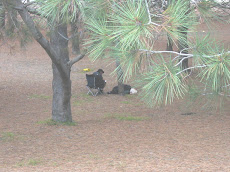


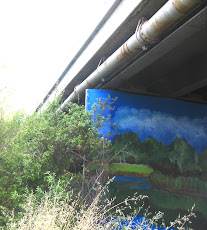
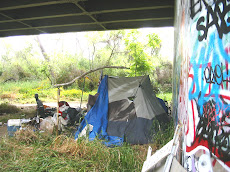








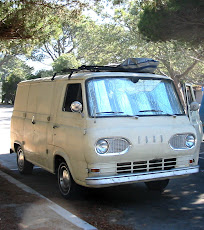
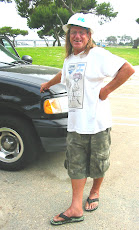









No comments:
Post a Comment